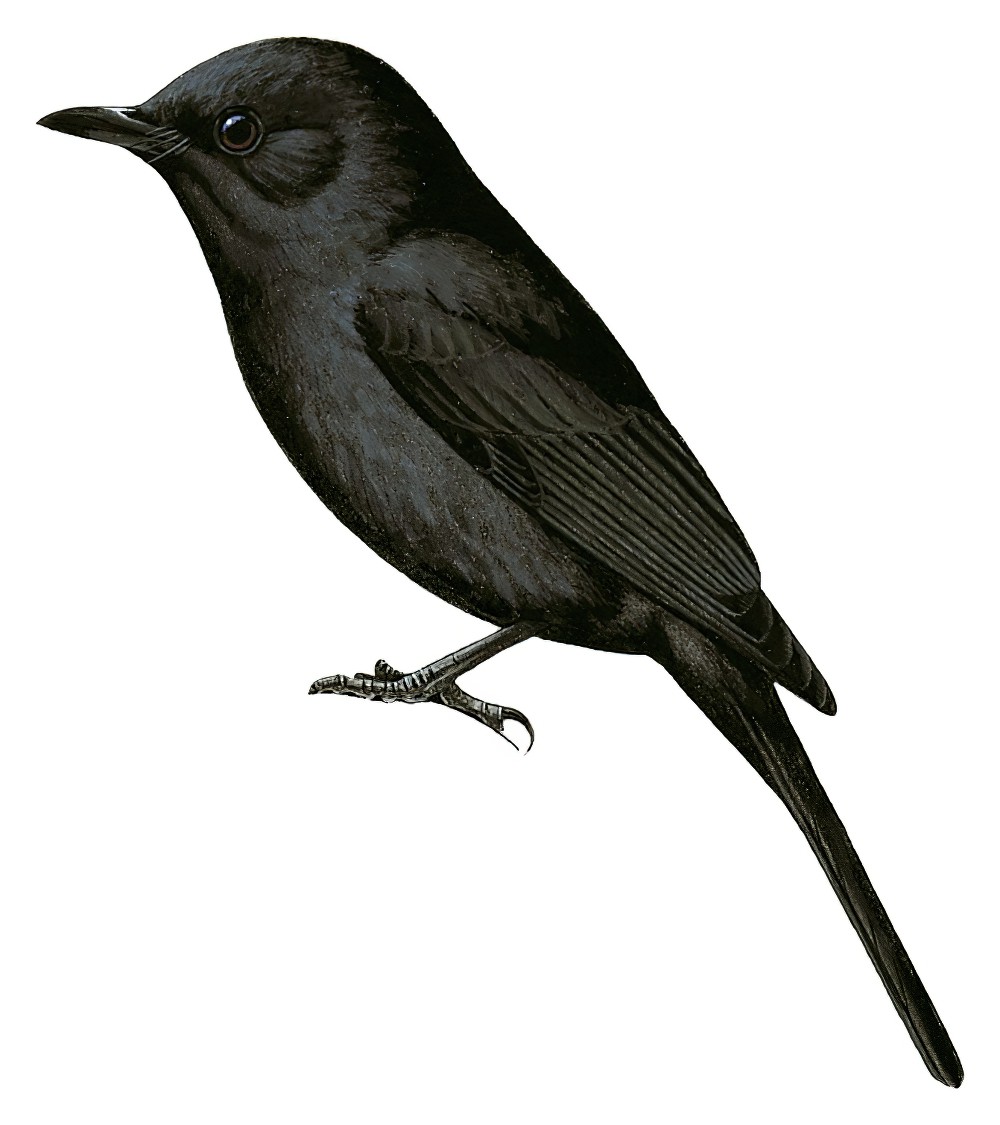Northern Black-Flycatcher / Melaenornis edolioides

Northern Black-Flycatcher
SCI Name:
Protonym: Melasoma edolioides BirdsW.Afr. 1 p.257 pl.29
Taxonomy: Passeriformes / Muscicapidae / Melaenornis
Taxonomy Code: nobfly1
Type Locality: Senegal.
Author: Swainson
Publish Year: 1837
IUCN Status: Least Concern
DEFINITIONS
MELAENORNIS
(Muscicapidae; Ϯ Northern Black Flycatcher M. edolioides) Gr. μελας melas, μελαινα melaina black; ορνις ornis, ορνιθος ornithos bird; "MELAENORNIS, n. Melasoma a, Swains. M. Edolioïdes, (Swains.) n. Nat. Libr. B. of W. Afr., pl. 29. ... a Used in Entomology." (G. Gray 1840); "Melaenornis G. R. Gray, 1840, List Gen. Birds, p. 35. New name for Melasoma Swainson, 1837, preoccupied by Melasoma Dillwyn, 1831." (Traylor in Peters 1986, XI, 296).
Var. Melaehornis, Meloenornis.
Synon. Dioptrornis, Empidornis, Melanopepla, Melasoma, Namibornis, Sigelus, Siopornis.
edolioides
Genus Edolius Rafinesque 1815, drongo; Gr. -οιδης -oidēs resembling; "WALKING DRONGO. Melasoma edolioides, SWAINS. ... The ornithologist will derive much instruction and interest from possessing this bird, and from comparing it with any one of the true Drongo Shrikes. The bills of both are formed upon the same model; but this is considerably smaller; the rictal bristles are proportionably equal, but in this type those which are in front are not directed over the nostrils. The wings of both are of the same general structure, but in this they are considerably shorter, and reach but a little way beyond the base of the tail, while this latter member, although equally long, is considerably rounded. This partial resemblance between the two genera extends to the feet ... by the length of the foot and the structure of the toes, Melasoma is enabled to walk upon the ground; a faculty which we know, both from analogy and collateral evidence, is not possessed by the Drongo Shrikes." (Swainson 1837) (see Melasoma) (Melaenornis).
SUBSPECIES
Northern Black-Flycatcher (edolioides)
SCI Name: Melaenornis edolioides edolioides
edolioides
Genus Edolius Rafinesque 1815, drongo; Gr. -οιδης -oidēs resembling; "WALKING DRONGO. Melasoma edolioides, SWAINS. ... The ornithologist will derive much instruction and interest from possessing this bird, and from comparing it with any one of the true Drongo Shrikes. The bills of both are formed upon the same model; but this is considerably smaller; the rictal bristles are proportionably equal, but in this type those which are in front are not directed over the nostrils. The wings of both are of the same general structure, but in this they are considerably shorter, and reach but a little way beyond the base of the tail, while this latter member, although equally long, is considerably rounded. This partial resemblance between the two genera extends to the feet ... by the length of the foot and the structure of the toes, Melasoma is enabled to walk upon the ground; a faculty which we know, both from analogy and collateral evidence, is not possessed by the Drongo Shrikes." (Swainson 1837) (see Melasoma) (Melaenornis).
Northern Black-Flycatcher (lugubris)
SCI Name: Melaenornis edolioides lugubris
lugubris
L. lugubris mournful, plaintive < lugere to mourn.
● ex “Merle brun du Sénégal” of d’Aubenton 1765-1781, pl. 563, fig. 1 (unident.).
Northern Black-Flycatcher (schistaceus)
SCI Name: Melaenornis edolioides schistaceus
schistaceum / schistaceus
Late L. schistaceus slate-grey < schistus slate < L. lapis schistos fissile stone < Gr. σχιστος skhistos cloven < σχιζω skhizō to split.
UPPERCASE: current genus
Uppercase first letter: generic synonym
● and ● See: generic homonyms
lowercase: species and subspecies
●: early names, variants, mispellings
‡: extinct
†: type species
Gr.: ancient Greek
L.: Latin
<: derived from
syn: synonym of
/: separates historical and modern geographic names
ex: based on
TL: type locality
OD: original diagnosis (genus) or original description (species)












